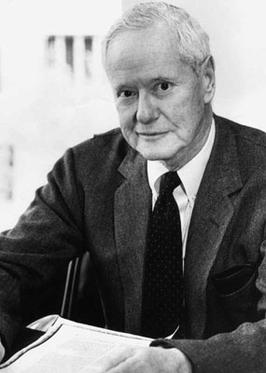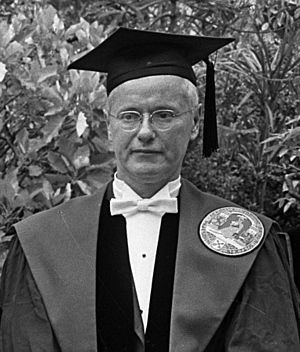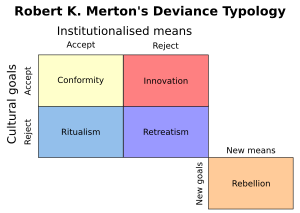Robert K. Merton facts for kids
Quick facts for kids
Robert K. Merton
|
|
|---|---|
 |
|
| Born |
Meyer Robert Schkolnick
July 4, 1910 Philadelphia, Pennsylvania, U.S.
|
| Died | February 23, 2003 (aged 92) New York City, U.S.
|
| Alma mater | |
| Known for |
|
| Spouse(s) |
|
| Children |
|
| Awards |
|
| Scientific career | |
| Fields | Sociology |
| Doctoral advisor | Pitirim Sorokin |
| Other academic advisors | Talcott Parsons, Lawrence Joseph Henderson, George Sarton |
| Doctoral students |
|
| Other notable students |
|
| Influences | |
Robert King Merton (born Meyer Robert Schkolnick; July 4, 1910 – February 23, 2003) was an important American sociologist. He is often called a founding father of modern sociology. He also made big contributions to the study of crime and how people act in society.
Merton taught at Columbia University for most of his career. In 1994, he received the National Medal of Science. This award recognized his work in sociology and for starting the field of the sociology of science.
Merton's ideas helped us understand society better. He came up with terms like "role model" and "self-fulfilling prophecy." A self-fulfilling prophecy happens when a belief or expectation, even if it's false at first, makes something come true. For example, if everyone believes a bank will fail, they might all take their money out. This action then makes the bank actually fail.
He also developed the idea of a "role model." This is someone whose behavior or success inspires others. This idea came from his theory of a reference group. A reference group is a group of people you compare yourself to, even if you're not part of that group.
Contents
About Robert K. Merton
Early Life and Name Change
Robert King Merton was born Meyer Robert Schkolnick on July 4, 1910. His family were Jewish immigrants from Russia who came to the United States. They lived in Philadelphia and faced tough financial times.
Even though his family was poor, Merton felt he had many chances. He often visited libraries and museums near his home. He said growing up in South Philadelphia gave young people "every sort of capital" except money.
Merton changed his name to Robert K. Merton because of his interest in magic. He performed magic tricks and first chose "Merlin" as his stage name. He later picked "Merton" to sound more American. He chose "Robert" to honor a famous French magician. He kept this name when he got a scholarship to Temple University.
His Education
Merton started studying sociology at Temple University from 1927 to 1931. His work as a research assistant helped him discover sociology. He later went to Harvard University and worked with Pitrim A. Sorokin, a leading sociologist.
Merton quickly started publishing his own articles while at Harvard. He earned his master's and PhD degrees in sociology. His first big study, Science, Technology, and Society in Seventeenth-Century England, helped create the sociology of science.
Merton's "Merton thesis" suggests a link between Protestant beliefs and the growth of early science. This idea is similar to Max Weber's famous claim about Protestant work ethic and capitalism.
Family Life
In 1934, Merton married Suzanne Carhart. They had three children: Robert C. Merton, Stephanie Merton Tombrello, and Vanessa Merton. His son, Robert C. Merton, won the Nobel Prize in economics in 1997.
Merton and Suzanne separated in 1968. In 1993, he married Harriet Zuckerman, who was also a sociologist. Robert K. Merton passed away on February 23, 2003, at the age of 92.
Merton's Career and Awards
Teaching and Research
Merton taught at Harvard until 1938. He then became a professor at Tulane University. In 1941, he joined Columbia University, where he spent most of his teaching career.
At Columbia, he held many important positions. He was the associate director of the university's Bureau of Applied Social Research. He was also named a University Professor, which is a very high academic honor. He retired from teaching in 1979.
Honors and Recognition
Merton received many awards for his research. He was one of the first sociologists chosen for the United States National Academy of Sciences. He was also the first American sociologist to be elected a foreign member of the Royal Swedish Academy of Sciences.
He was given a Guggenheim Fellowship and was the first sociologist to be named a MacArthur Fellow. More than twenty universities gave him honorary degrees. These included Harvard University, Yale, and Columbia University.
In 1994, Merton became the first sociologist to receive the US National Medal of Science. This was for "founding the sociology of science" and his work on the self-fulfilling prophecy.
Merton's Key Ideas
Middle-Range Theory
Merton believed in "middle-range theories." These theories focus on specific parts of society, not on society as a whole. They are based on real-world observations and data.
He felt that very broad theories were too far from how people actually behave. Middle-range theories help connect general ideas with specific facts. They fill the gap between simple descriptions and huge, all-encompassing theories.
Strain Theory
Merton's "strain theory" explains why people might act in deviant ways. He said that deviance can happen when people cannot reach their goals through normal, accepted ways.
For example, if someone wants to achieve the "American Dream" but doesn't have the legal means to do so, they might feel frustrated. This frustration could lead them to break rules or laws.
However, this theory has been criticized. It might suggest that only poorer people become criminals. This isn't always true, as people from all backgrounds can commit crimes.
Unintended Consequences and Functions
Merton also described "unanticipated consequences." These are results of actions that were not planned or expected. Everyone knows about the planned results, but the unplanned ones are harder to see.
He also talked about manifest functions and latent functions.
- Manifest functions are the obvious, intended results of an action or social practice.
- Latent functions are the hidden, unintended results.
For example, a school's manifest function is to educate students. A latent function might be to teach students how to follow rules or to help them make friends. Merton said that sociologists need to look deeper to find these latent functions.
He also noted that some unintended consequences can be "dysfunctional." This means they are harmful to the system. Others might be "non-functional," meaning they don't help or harm the system.
Functional Alternatives
Merton believed that societies need certain things to survive. But he also stressed that there are many ways to achieve these needs. Different institutions or actions can perform the same task.
This idea of "functional alternatives" helps us see that there isn't just one way for society to work. It also prevents us from thinking that the way things are now is the only or best way.
Theory of Deviance
Merton's theory of deviance looks at how culture and social structure can lead to people breaking rules. He said that deviance often happens when there's a mismatch between what society values (like success) and the accepted ways to achieve it.
He used the term anomie, which means a state of normlessness or confusion. For Merton, anomie happens when people want to achieve cultural goals (like the American Dream) but don't have fair ways to reach them. This can push people towards illegal actions.
Merton showed that deviance isn't just about bad people. It can come from the way society itself is set up. If everyone shares the same values but not everyone has the same chances, it can lead to deviance.
Merton described five ways people adapt to these situations:
- Conformity: People accept both the goals (like success) and the accepted ways to achieve them (like hard work).
- Innovation: People accept the goals but reject the accepted ways. They find new, often unaccepted, ways to get what they want (like stealing for money).
- Ritualism: People reject the goals but stick to the accepted ways. They might go through the motions of work without aiming for big success.
- Retreatism: People reject both the goals and the accepted ways. They might withdraw from society (like someone who becomes homeless).
- Rebellion: People reject both the existing goals and ways. They try to replace them with new ones (like revolutionaries).
Sociology of Science and CUDOS
Merton was very interested in the sociology of science. This field looks at how social and cultural structures affect science. For example, he studied how military groups helped science grow during the Scientific Revolution.
He developed the "Mertonian norms" of science, often called "CUDOS." These are ideals that scientists should follow:
- Communism: Scientific discoveries should be shared by everyone. Scientists give up their ownership of ideas for recognition.
- Universalism: Truth claims should be judged on their own merit, not on who made them (race, gender, nationality).
- Disinterestedness: Scientists should act in ways that seem selfless, focusing on truth rather than personal gain.
- Organized skepticism: All ideas must be tested and questioned by the scientific community.
Merton also introduced ideas like "obliteration by incorporation." This is when an idea becomes so popular that people forget who invented it. He also noted "multiples," which are similar discoveries made independently by different scientists.
He studied how famous scientists sometimes get more credit than they deserve. Less-known scientists might get less credit than they should. Merton called this the "Matthew effect."
Influences on Merton
Merton was greatly influenced by his teachers and other thinkers. Talcott Parsons and Pitirim Sorokin were important mentors at Harvard. He also learned from Lawrence Joseph Henderson, who taught him how to investigate ideas carefully.
The historian of science George Sarton also inspired Merton's interest in science. Other sociologists like Émile Durkheim and Georg Simmel also shaped his understanding of society.
Merton's Legacy
Today, Robert K. Merton is seen as one of the most important figures in modern sociology. His ideas and research continue to influence many sociologists. His work helped create and support the modern field of the sociology of science.
The Robert K. Merton Award is given each year for the best paper in analytical sociology. This shows how much his work is still valued.
See also
 In Spanish: Robert King Merton para niños
In Spanish: Robert King Merton para niños
- Historic recurrence
- Logology (science of science)
- Narcotizing dysfunction
- Role set
- Sociology of scientific knowledge
 | Georgia Louise Harris Brown |
 | Julian Abele |
 | Norma Merrick Sklarek |
 | William Sidney Pittman |



